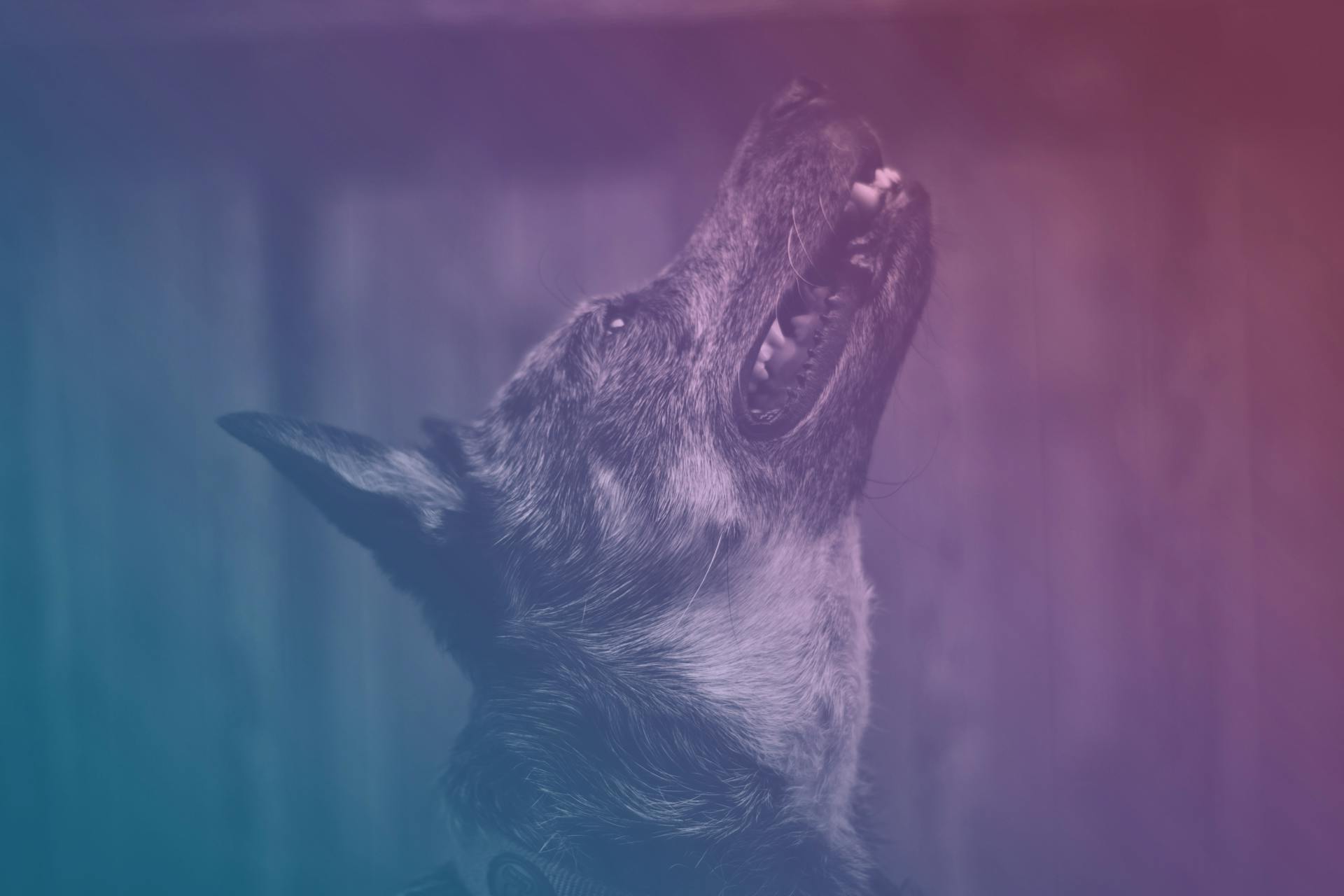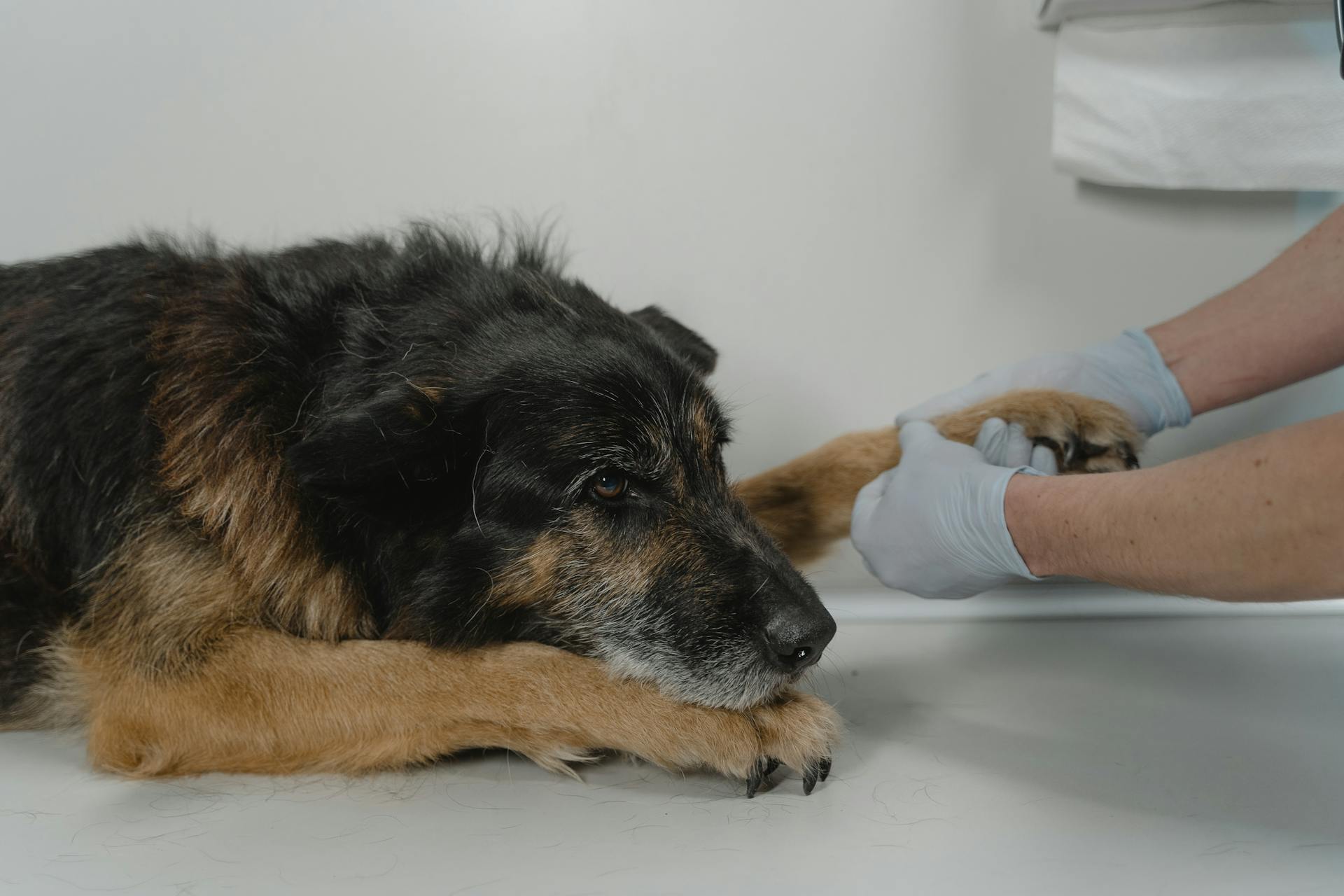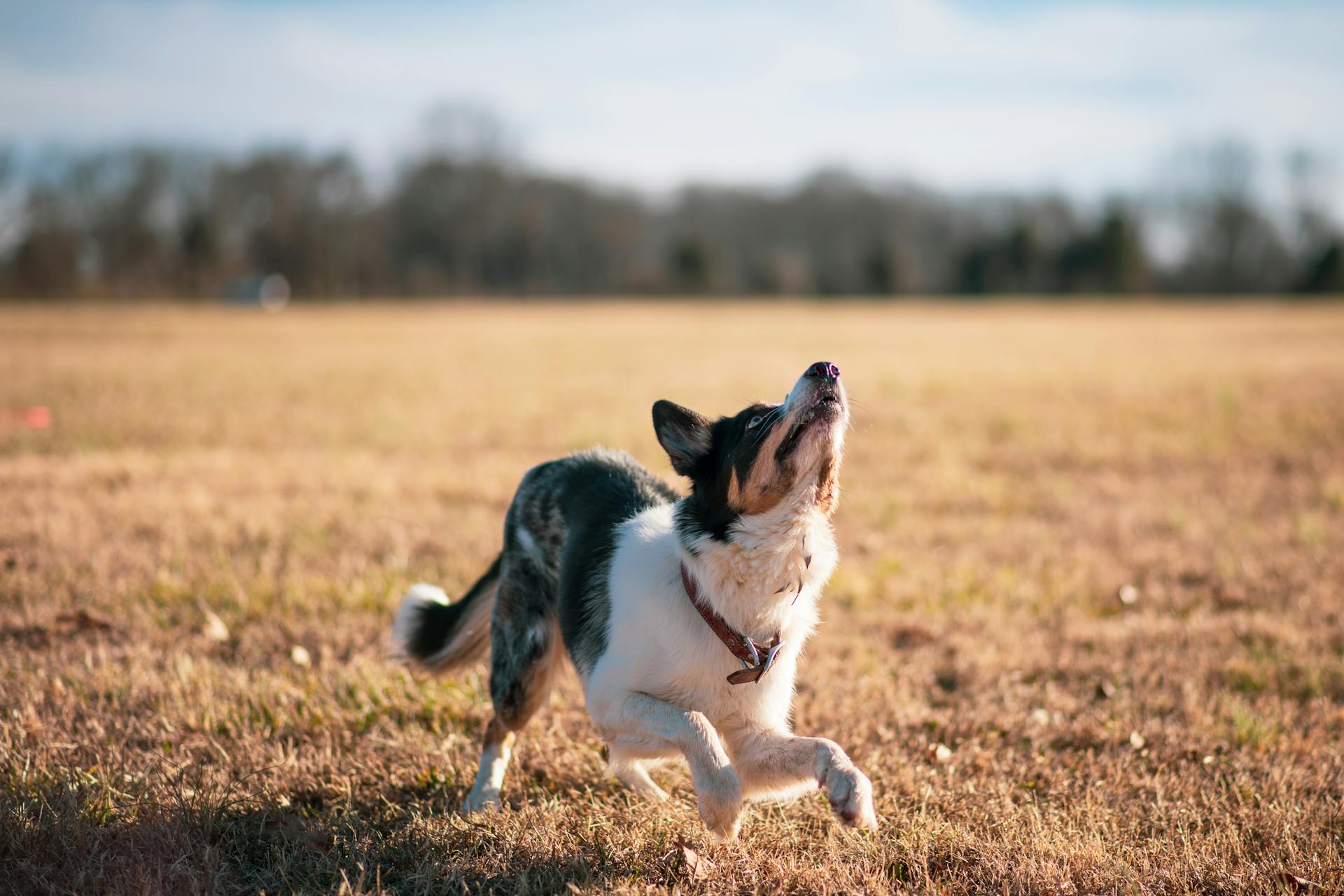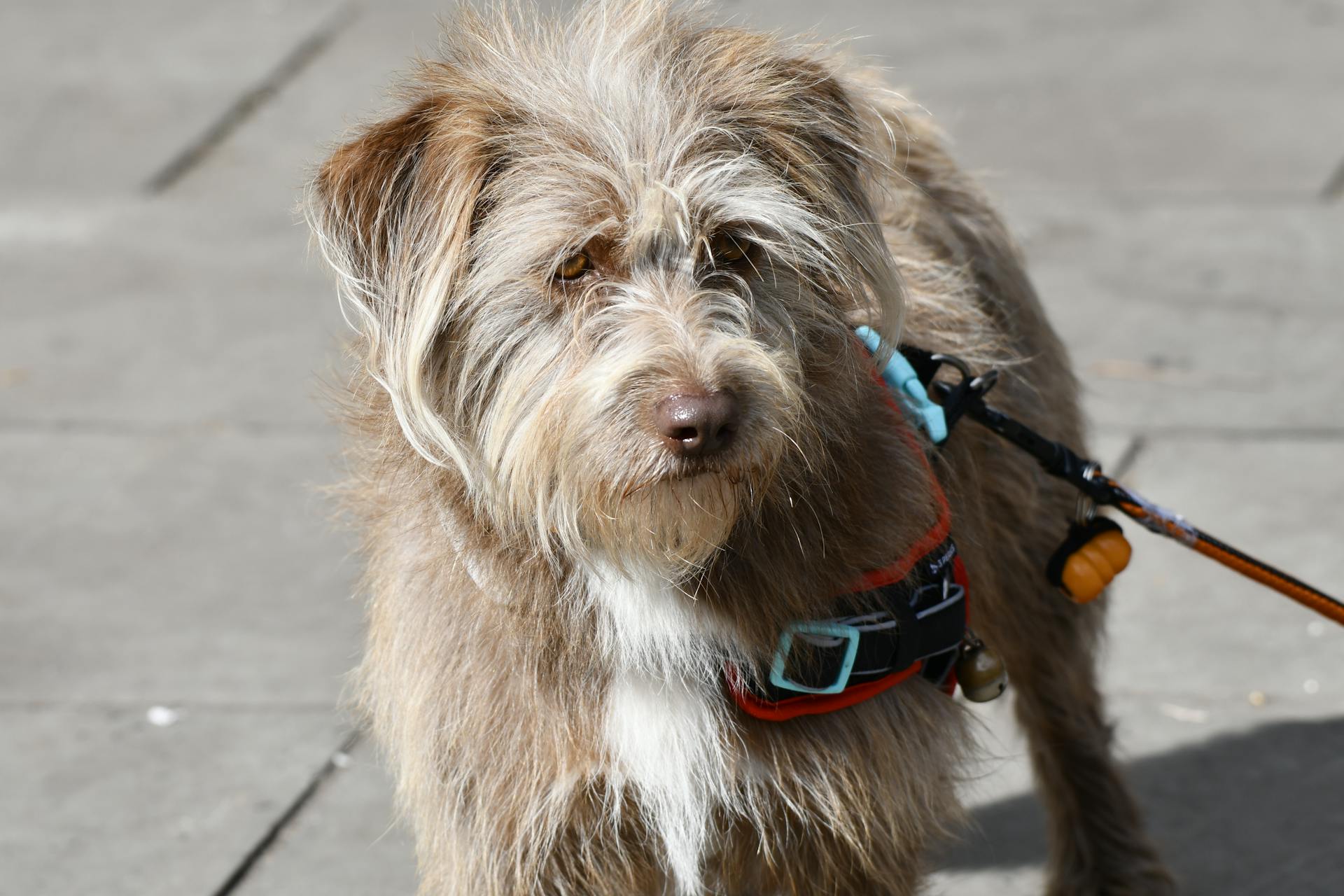
Welcome to the world of Short Haired Dutch Shepherd puppies! These adorable bundles of energy are a joy to have around, but they do require some special care to thrive.
They need regular exercise, at least 1-2 hours a day, to keep them happy and healthy. This can be a mix of physical and mental stimulation, such as walks, runs, and playtime in the yard.
A nutritious diet is essential for a healthy puppy. Feed them high-quality puppy food, divided into 3-4 meals a day, until they're about six months old.
Temperament and Care
The Dutch Shepherd temperament is a unique blend of intelligence, energy, and loyalty. They are happiest when working and require a good deal of mental and physical stimulation.
Dutch Shepherds are highly intelligent and alert dogs, capable of outsmarting their owners if given the opportunity. They are also vigilant and will bark whenever they see new people or anything out of place.
As a short-haired Dutch Shepherd puppy owner, you can expect to spend about 90 minutes to two hours every day on exercise and mental stimulation. This can include activities like agility and obedience training.
Dutch Shepherds are naturally cautious around strangers at first, so socializing your puppy is vital to make sure they are comfortable around new people. Consistent training from an early age is also crucial to ensure a happy and well-behaved companion.
Their short- to medium-length coat requires moderate grooming, including weekly shedding management and regular nail trimming and tooth brushing. A commitment to consistent care and attention will reward you with a loyal and loving companion.
Health and Nutrition
Dutch Shepherds have a lifespan of 11 to 14 years and are generally a healthy breed, but genetic health problems can occur.
Hip and elbow dysplasia is a common issue in larger breeds like the Dutch Shepherd, which can be painful and serious if left untreated. Regular screenings, such as Penn Hip Improvement Program (PennHIP) or Orthopedic Foundation for Animals (OFA) diagnostic screenings, can help detect these diseases early on.
See what others are reading: Hip Problems in Border Collies
Thyroid problems are also a concern for long-haired Dutch Shepherds, which can be detected through regular screenings with your vet. Hypothyroidism, a condition where the dog's metabolism slows due to low thyroid hormones, can be treated with medication.
To support your Dutch Shepherd's overall health, consider adding supplements like omega-3 fatty acids (fish oil), probiotics, multivitamins, and joint supplements to their diet. However, be sure to consult with your vet before starting any new supplements.
A high-protein dog food is essential for Dutch Shepherds, especially considering their active lifestyle. Look for a food that meets the nutritional standards of the Association of American Feed Control Officials and consult with your vet for the recommended serving size and frequency.
Here are some key dietary tips to keep in mind:
- Feed high-quality, high-calorie food to support your Dutch Shepherd's active lifestyle.
- Choose a food that meets the nutritional standards of the Association of American Feed Control Officials.
- Feed puppy food to puppies, adult food to adults, and senior food to senior Dutch Shepherds.
- Manage portion sizes to prevent obesity.
Health
Dutch Shepherds are generally a healthy breed, but like all breeds, they can be prone to certain health issues.
A Dutch Shepherd's lifespan is typically between 11 to 14 years, but genetic health problems are relatively rare. However, there are a few issues to watch out for.

Hip and elbow dysplasia can be a painful and serious issue for larger breeds like the Dutch Shepherd. This condition occurs when the ball of the hip or elbow joint doesn't fit well in its socket.
Thyroid conditions, particularly hypothyroidism, can affect long-haired Dutch Shepherds. Regular screenings with your vet can help detect and treat problems early on.
Goniodysplasia, a form of glaucoma, can affect Dutch Shepherds with a rough-haired coat. It's essential to treat this condition right away to prevent vision loss.
To support your Dutch Shepherd's overall health, consider adding supplements to their diet. Omega-3 fatty acids, probiotics, multivitamins, and joint supplements can be beneficial.
Here are some supplements that may be helpful for your Dutch Shepherd:
- Omega-3 fatty acids (fish oil)
- Probiotics
- Multivitamins (based on life stage)
- Joint supplements
Remember to consult with your vet before starting new supplements to ensure they're suitable for your dog's needs and health status.
Diet
A Dutch Shepherd's diet is all about fueling their high energy lifestyle. They need a high-protein dog food to build and sustain muscle.
Intriguing read: Are Border Collies High Maintenance
Looking for a dog food that meets the nutritional standards of the Association of American Feed Control Officials is a must. This ensures your Dutch Shepherd gets the nutrients they need to thrive.
High-quality proteins like chicken, beef, or fish are great options to match their active lifestyle. Avoid foods with excessive fillers or artificial additives.
A feeding routine that revolves around your Dutch Shepherd's age, activity level, and health status is key. Typically, adult dogs thrive on a twice-daily feeding schedule.
Here's a rough guide to help you determine your Dutch Shepherd's daily feeding amount:
Remember, your veterinarian can give you a better recommendation based on your individual dog's health and lifestyle. And, as a general rule, don't forget to manage portion sizes to prevent obesity.
Training and Exercise
Training and exercise are crucial for a short-haired Dutch Shepherd puppy. They need regular training sessions to keep them engaged and stimulated.
Short, active training sessions are best for this intelligent breed to keep them focused and eager to learn. Positive reinforcement, such as rewards with treats, toys, and praise, makes the training experience more enjoyable for everyone.
To provide mental and physical stimulation, Dutch Shepherds need a combination of exercise and enrichment activities. One to two hours of exercise each day, including long walks and structured activities like hiking or agility, should be plenty to burn off their excess energy.
Here are some fun activities to consider:
- Agility courses
- Nose work
- Dock diving
- Water retrieving
- Frisbee/disc dog competitions
- Herding trials
- Farm work
- Tracking
- Flyball
- Hiking
- Running
- Interactive puzzle toys
Training
Dutch Shepherds are highly trainable, thanks to their intelligence and eagerness to please their families.
Training sessions should be short and active to keep your dog engaged and focused. Dutch Shepherds excel at following directions and are quick-witted, making them a highly trainable breed.
Positive reinforcement, such as rewarding good behavior with treats, toys, and praise, is key to making the training experience enjoyable for everyone. This approach will help your dog learn complex skills like jumps, scent training, and protection training.
Daily decompression walks and enrichment activities are essential throughout your dog's life to keep them stimulated and focused. These dogs do best with patient pet parents who can work at their pace.

Socialization is crucial, even for friendly Dutch Shepherds. Enrolling your dog in puppy school is a great way to help them learn how to play nicely with other puppies and meet other pet parents.
Training should be started early, when your dog is young, to make the most of their intelligence and energy. Consistent training with a goal in mind is best for Dutch Shepherds, but be prepared for some stubbornness due to their intelligence.
Exercise
Dutch Shepherds are built for physical activity and need a lot of exercise to stay happy and healthy. They'll keep pace with you on long treks and do it all again tomorrow without a word of complaint.
You'll need to fit in one to two hours of exercise each day, which could include a long stroll and/or dog sports like catch or fetch. Don't forget to give them some time puzzle time to engage their intelligent minds.
Additional reading: When Is Best to Breed a Dog

Long walks twice per day are a requirement for Dutch Shepherds. You also need to consider doing structured activities with your Dutch Shepherd throughout the week, including things like hiking, agility, running, or backyard games.
If you don't give your Dutch Shepherd enough stimulation, they can become anxious, destructive, and hyperactive, which can make them disruptive. To avoid this, make sure to provide them with mental stimulation through games, puzzles, or training.
Here are some fun activities you can do with your Dutch Shepherd:
- Agility courses
- Nose work
- Dock diving
- Water retrieving
- Frisbee/disc dog competitions
- Herding trials
- Farm work
- Tracking
- Flyball
- Hiking
- Running
- Interactive puzzle toys
Grooming and Environment
Dutch Shepherds are built to thrive in outdoor environments, so they're not fazed by cold weather or rain. They're perfect for homes with fenced yards in the suburbs or farms.
They do require regular exercise, so if you're a city person, you'll need to make sure they get plenty of time to run and play. A daily, large, fenced-in area is essential for their happiness and health.
Their coat is dense and weather-resistant, with a moderate shedding level throughout the year. They do shed more during seasonal transitions, but regular grooming can help keep them looking their best.
Grooming Guide
The Dutch Shepherd's coat is a dense, weather-resistant one that can be short to medium in length.
Regular grooming is low maintenance, but it's still essential to pay attention to specific areas. Dutch Shepherds maintain a moderate shedding level throughout the year, with increased shedding during seasonal transitions in spring and fall.
Their ears need regular attention to stay healthy.
Dutch Shepherds have a moderate shedding level, which means you'll need to brush them more frequently during seasonal transitions.
Nail trimming and dental care are also crucial for their overall health.
Check this out: Do Border Collies Need to Be Groomed
Environment
Dutch Shepherds are not suited for city living without a large, fenced-in area.
They need a family with an active lifestyle to keep them happy and healthy.
Farms, country houses, and homes with fenced yards in the suburbs are perfect for this breed.
In fact, you won't find many Dutch Shepherds who enjoy sleeping the entire day away on the front porch.
This dog is built to work outdoors, so cold weather and rain aren't likely to faze them.
Some Dutch Shepherds may be sensitive to warm weather, though, so a hot and humid climate isn't their ideal home.
Owning and Caring
Owning a short-haired Dutch Shepherd puppy requires a significant time commitment for exercise and training. With 90 minutes to two hours of exercise per day, you'll need to be prepared to take your puppy on long walks and jogs.
Socialization is key to helping your puppy feel comfortable around new people. Consistent training from an early age is also crucial for a well-behaved companion.
A moderate amount of grooming is needed to manage shedding, which can be done weekly. This will also help you get to know your puppy's unique brindle pattern.
Related reading: How Much Exercise Do Border Collies Need
Owning Essentials
Owning a Dutch Shepherd requires some essential items to ensure their happiness and well-being. You'll want to invest in a high-quality dog bed for them to snuggle up in after a long day of play.
A Dutch Shepherd's high energy levels mean they need plenty of exercise, so you'll want to have a sturdy leash and collar on hand. You can expect to spend around 90 minutes to two hours per day on walks and jogs.
A different take: Are Border Collies High Energy
To keep their coat looking its best, you'll need to brush them regularly. The frequency of grooming depends on the coat type, with shorter coats requiring less maintenance.
Here are some key grooming essentials to consider:
You'll also want to keep an eye on their nail health and brush their teeth regularly to prevent tartar buildup.
Pet Compatibility
Dutch Shepherds are generally compatible with other dogs, but you may encounter issues with small pets.
They have a strong herding instinct, which can lead them to try to herd small animals, and sometimes even chase them off.
Intelligent Dutch Shepherds can learn to get along with cats, but the transition may not be smooth.
It's essential to socialize your Dutch Shepherd well, especially if you have other pets in the house.
Final Thoughts
Dutch Shepherds are very interesting dogs. They are very smart and highly energetic.
To keep them focused and well-behaved, Dutch Shepherds need a lot of stimulation. This is especially true for active families who can provide them with plenty of exercise and mental stimulation.
If you're willing to put in the work, Dutch Shepherds can be enduring and versatile companions.
Frequently Asked Questions
Is Dutch Shepherd a good dog?
Dutch Shepherds thrive as active family pets when provided with regular exercise and mental stimulation. They're ideal for families who can offer a dynamic lifestyle
Featured Images: pexels.com


